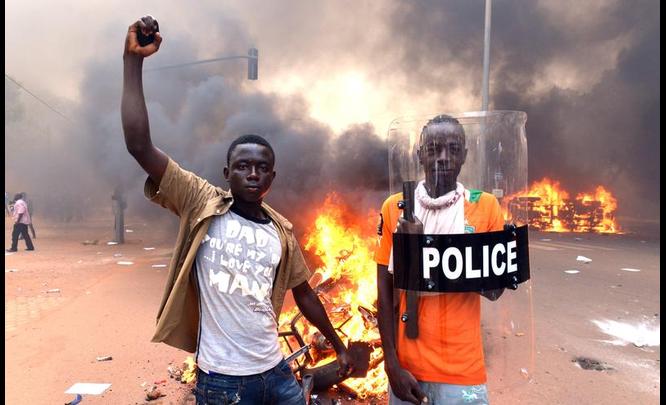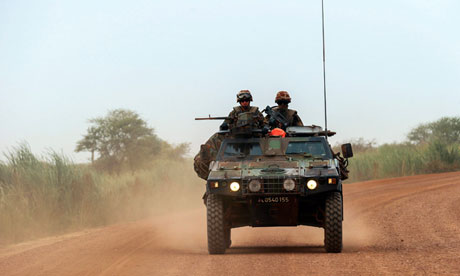 As the turbulent political environment in Burkina Faso continues to evolve, the restoration of a civilian-led government is not the victory it seems. Ceding to the request of angry protesters, former President Blaise Compaore resigned as Burkina Faso’s head of state and subsequently fled into self-exile. In the following weeks, the army, along with opposition parties, civil groups and religious leaders, drafted a transition charter, articulating a plan to consolidate democratic governance in the West African nation. Although the state of Burkina Faso seems to be headed toward stability, the recent appointment of Lieutenant Colonial Issac Zida as the transitional government’s Prime Minister is an alarming advent.
As the turbulent political environment in Burkina Faso continues to evolve, the restoration of a civilian-led government is not the victory it seems. Ceding to the request of angry protesters, former President Blaise Compaore resigned as Burkina Faso’s head of state and subsequently fled into self-exile. In the following weeks, the army, along with opposition parties, civil groups and religious leaders, drafted a transition charter, articulating a plan to consolidate democratic governance in the West African nation. Although the state of Burkina Faso seems to be headed toward stability, the recent appointment of Lieutenant Colonial Issac Zida as the transitional government’s Prime Minister is an alarming advent.
Reigning over Burkina Faso for 27 years, Blaise Compaore announced his intention to amend the country’s constitution and extend his presidential term, seeking re-election in 2015. Drafted in 2000, article 37 of the Burkinabe Constitution limits presidents to two five-year terms in office. Indeed, upon hearing this announcement, Burkinabe residents gradually infiltrated the capital city, Ouagadougou, yelling “step aside!” and “don’t touch article 37.” Increasingly disgruntled, the nation’s residents resorted to violent means to communicate their disapproval, leading Campaore, to declare a state of emergency. Days later, however, Compaore announced his resignation and called for an election at the end of a 90-day transition period.
Adding to confusion in the capital, reports inferred that two army officials were attempting to usurp the position at the top. As of October 31, both the military chief, General Traore, and military official, Lieutenant Colonel Issac Zida, simultaneously declared that they would assume the role of head of state during the transitional period. Brushing aside the dispute over leadership, Issac Zida officially took Burkina Faso under military-rule. As expected, opposition leaders, the African Union, and other interested parties began pressing Zida to return the state to civilian-rule, fearful that the country’s fate would be decided by a military junta.
Granting the military two weeks to reinstate civilian-rule, the African Union threatened to place economic sanctions on Burkina Faso if Zida failed to comply. However, by November 14, the army, in concert with opposition parties and religious leaders, settled on a transitional arrangement that would see civilians regain governmental authority, and a schedule to bring stability back to Burkina Faso. Appointed by the military, as well as traditional and religious groups, Michel Kafando was instructed to direct the country during the transitional period. Moreover, vested with appointment prerogatives, President Kafando announced on November 19 that Lt. Col. Issac Zida would assume the role of Prime Minister during the transition. Tasked with forming a 25-member parliament to implement reforms for the future and organize next year’s elections, Zida quickly snatched power back in the hands of the military.
Although national authorities continue to downplay Zida’s appointment, the choice has inevitably caused a great amount of suspicion among Burkinabes. Despite demands to enhance transparency and accountability within government institutions, human rights advocates have continued to criticize the military for corruption and ignoring the law. As it is, the recent appointment seems to be running counter to the direction that citizens of Burkina Faso insist upon.
Scholars who study the capacity of transitional governments to facilitate democratic governance have found systemic trends that cause divergent outcomes, ranging from the consolidation of democracy, to the implementation of a military oligarchy. For example, Rollin Tusalem finds that where the military has institutionalized its role in politics as being interventionist, the consolidation of democracy becomes difficult. Furthermore, due to their activist role during the transition period, military officials become hesitant to relinquish political influence in the post-transitional period, and therefore attempt to influence the new constitutional order. They may insist on retaining powers such as limiting the president’s control of the military, employing laws that prohibit the military from being prosecuted in civilian courts, and other powers that clearly defy the underlying concept of democratic governance.
Though the transition charter notes that members of the interim government may not run for office in next year’s election, PM Zida and his handpicked parliament may undermine the prospect for democratic governance by enhancing the dominance of the military in state affairs. Obtaining a high post in government, Lt. Col. Zida may disturb the democratic transition by imposing military preferences on the civilian-led regime. With the existing documentation of military corruption within Burkina Faso, the future success of this land-locked state depends on the armed forces’ extrication from political involvement.




